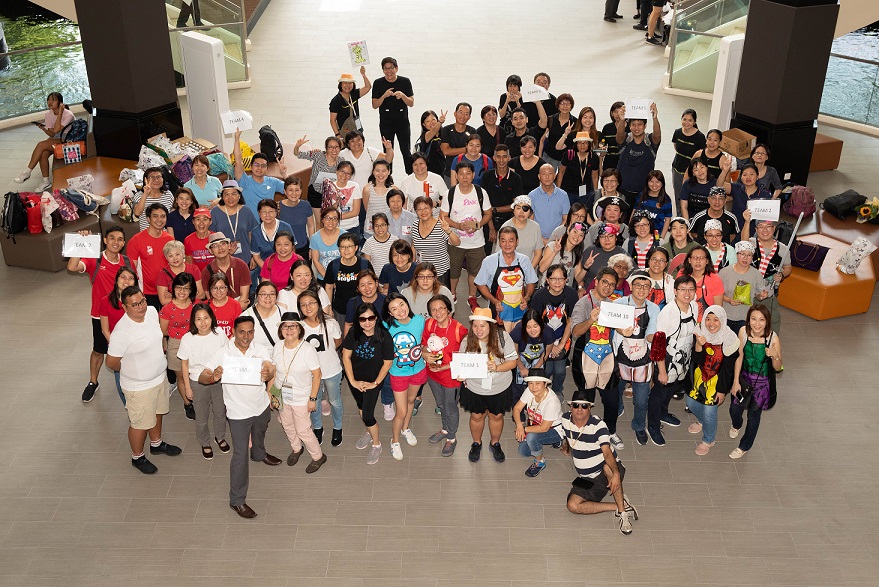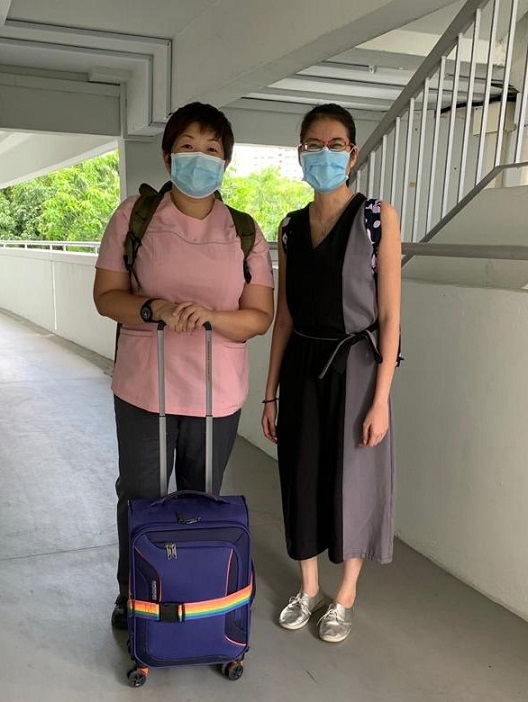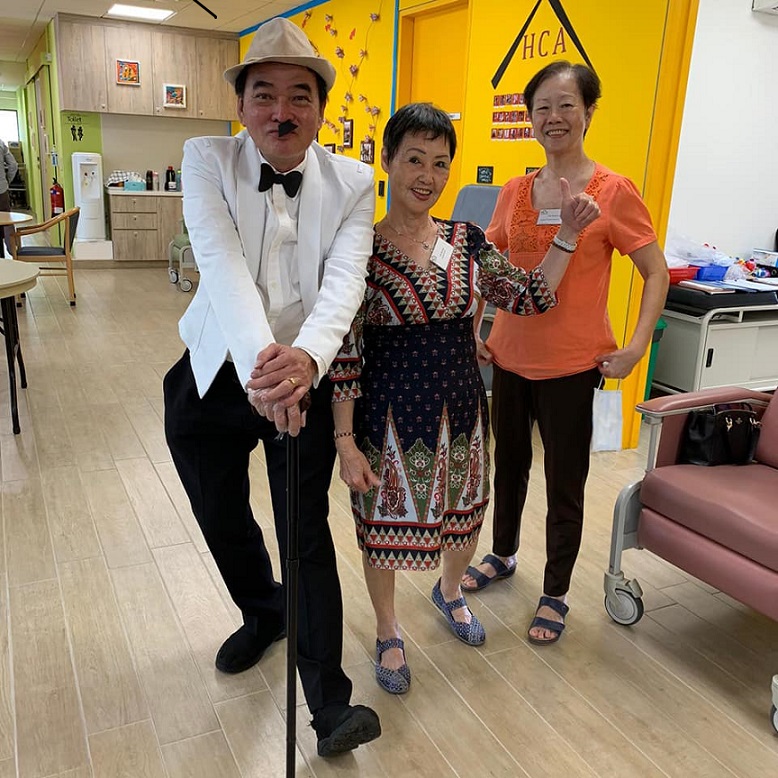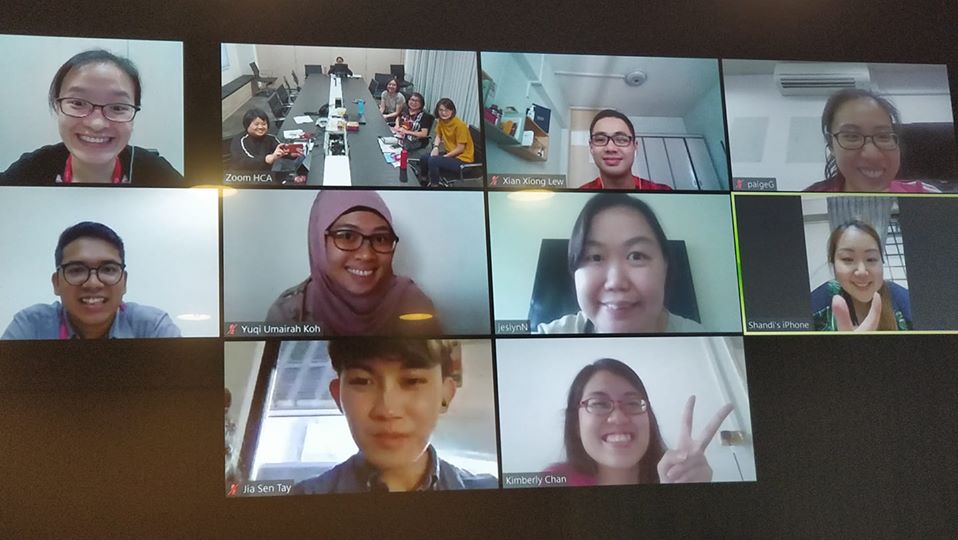
Close


The COVID-19 pandemic has irrevocably changed the way we lead our lives. Face-to-face discussions have been replaced by web-meeting software, text messages now replace warm smiles and reassuring pats on the shoulder.
The human touch is the core of HCA’s work, but social distancing and masks have now become the new normal. The impact of the outbreak is far-reaching, yet it challenges us to stay united and explore new ways of reaching out to our patients and their families.
In the Q&A ahead, we speak with Assistant Day Hospice Supervisor, Polly Lim, Senior Palliative Care Nurses Ren Hui and Xu Fen, Palliative Care Nurse Poh Ya Nee and Medical Social Workers Tay Jia Sen and Kimberly Chan to find out how they are coping.
Jia Sen: I would start the day at 8:30am, attending our morning meeting. This is when our team members would update one another on the condition of our patients and highlight pertinent issues. After the morning meeting, I would start contacting my patients to make appointments for my home visits.
Due to the social distancing measures, most seats at the void deck have been cordoned off, so I would have a heavy breakfast before I leave home. However, sometimes, my schedule can be packed and that is when I would have to make do with a simple lunch in between visits.
Once I get home from my visits, I would head straight to the shower to disinfect myself and my clothes before sitting down to update my case notes.
Kimberly: I think a typical day of work in the office and a work-from-home arrangement is rather similar – filled with meetings, home visits and administrative work, etc. But of course with the work-from-home arrangement, I get to start the day in the comfort of my home and I also get to spend time with my family members during lunch breaks at home.

Ya Nee (left) and Kimberly (right) getting ready for a home visit.
Ya Nee: Despite not needing to travel to work, I maintain my usual circadian rhythms by waking up at the same time to exercise, read or do chores. Much of the work routine remains the same, except that face-to-face meetings are replaced with video conferences and non-urgent visits are replaced with phone calls and video calls.
The time saved on commuting is spent on reading up new publications, attending on-line workshops, reviewing and improving work processes, which I previously did not have time to do. I have been skipping lunch mostly as it is challenging to eat outside now. No complaints as this is my own choice!
Polly: The centre is less busy now and suddenly you can feel that it’s a lot quieter. Nevertheless, the patients still enjoy themselves as the Day Hospice team now has the opportunity to introduce them to new games. It was more difficult to devote as much time to teach each of them when the Day Hospice was running at full capacity.
Are the patients worried? Frankly, I think it was a YES in the very early stages of the outbreak. They would come to me and question some precautionary measures that were put in place. However, as we implemented new safety precautions in accordance with governmental advisories – for example, constantly reminding and ensuring they wash their hands properly throughout the day, avoiding putting their hands on their faces and heads, avoiding crowded places, practising social distancing and wearing a mask – they now feel that the Day Hospice is a safer place to be.
Jia Sen: I would say that it has been a challenge to adapt to the latest guidelines, which have inevitably affected our work processes, as the COVID-19 situation evolves in Singapore.
During this extraordinary period, I have to rely more on technology in order to connect with my team members. Having team meetings online lacks the emotional connection that face-to-face conversations can create. However, in current circumstances, it is the most convenient way for us to keep in touch and maintain our working relationships.
Kimberly: Planning for my meals in between visits, since finding a suitable spot to have a proper meal outside has become a tad challenging – otherwise everything else is still manageable.
Ren Hui: It is not easy to top up our medical supplies, as we try not to go back to the office too frequently. It may also take a longer time to settle certain things because everyone is now working from home.
Xu Fen: We have to wear a mask for long hours in hot weather every day. It is very inconvenient to drink water and stay hydrated. At the end of the day, I feel really tired.
Ya Nee: Initially, I was worried about how to substitute the element of “touch”, which is so essential in our work. I soon realised, physical touch can be replaced with the sincerity of heartfelt words. Patients and families have been supportive and appreciative. There is no challenge too big when we consider what the rest of Singapore and the world are facing. I have learned to roll with the uncertainties.

Lots of make-believe and “Charlie Chaplin” fun at HCA Day Hospice.
Polly: I would definitely reckon that PROTECTION is the biggest challenge the team needs to face daily. We have to ensure that every single patient is safe before being picked up and after we send them home, which is close to impossible because we don’t stay together. We also need to ensure that we practise good hygiene, before getting into contact with our patients. These are very REAL challenges that the team need to face every day because we are responsible for our patients and, of course, not forgetting our families when we return home to them.
The team is also challenged to think out of the box, in drilling the severity of COVID-19 and encouraging patients to practise good personal hygiene. Eventually we came out with dance exercises on the Seven Steps of Proper Hand Washing, accompanied by the song “Saturday Night Fever”! We created many Covid-19 quizzes for patients to stay updated. With outings suspended, we created a make-believe “Safe Outing @ HCA Day Hospice” to alleviate their boredom from staying in all the time.
Transportation is definitely another big challenge! In order to practise safe distancing, we can only take three to four patients in one trip. We used to take up to nine patients at one go, so we are talking about doubled or tripled workloads for the team.
Jia Sen: Being part of a healthcare team, I am always concerned about how I may unknowingly be infected by the virus and pass it to my patients or family members as an infected person can remain asymptomatic. Secondly, the anxiety stemming from not knowing how long this pandemic would last also brings discomfort to me.
Ya Nee: As many people diagnosed with COVID-19 are asymptomatic, my biggest fear is catching it and passing it to someone who isn’t strong enough to fight it.
Xu Fen: I have an elderly mother and children at home. I am worried about bringing the virus home. I have never been worried for myself.
Polly: This is interesting – when I was checking in with the team to see how they were coping, I found that we actually share the biggest worry: “What if I’m infected and pass it to our patients, who have already suffered so much, or we bring the virus back to our own family?”
Jia Sen: The sense of camaraderie – that all of us are in this journey together as a community – gives me the strength to carry on serving our beneficiaries.
In the midst of this adversity, I also remind myself to be mindful about how the news on social media affect my emotions. There are days when I take a break from social media when I feel that I am overwhelmed by the barrage of information that’s available online.
I believe in the saying, “When the going gets tough, the tough get going”. Thus, I believe that we will be able to overcome this adversity eventually.

The HCA team staying connected and supporting each other through web-meeting software.
Ren Hui: Remembering my responsibilities as a nurse, to care for the needs of our patients and their families. The support from my fellow colleagues, management and beneficiaries really helps too.
Ya Nee: The resilience displayed by other healthcare professions and frontline workers keeps me going. Thank you everyone for your service!
Polly: I think it’s the human instinct of caring for those in need that keeps us going, especially in these difficult times. Of course, the appreciation of patients and caregivers’ trust in HCA’s Day Hospice service help too. Lastly, let’s not forget the support from the loved ones of all frontline workers – we know you are deeply worried yet remain silent in order not to burden us. Without your support, we wouldn’t be able to keep going. Kudos to all!